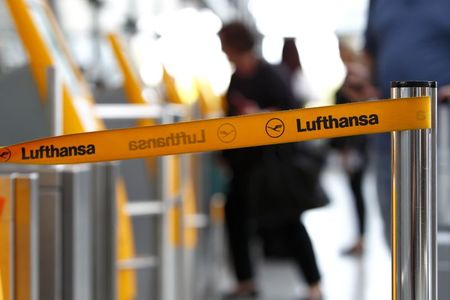FRANKFURT/BERLIN (Reuters) - Lufthansa's pilots' union said it could call for further strikes this week if the German airline fails to resume negotiations over retirement benefits, heaping pressure on management as the eighth walkout this year continued.
Lufthansa pilots began a strike at 1100 GMT (12 noon BST) on Monday on short haul flights and widened that to include long haul flights on Tuesday.
"We explicitly do not rule out further strikes this week if Lufthansa doesn't budge," Markus Wahl, a board member at union Vereinigung Cockpit, told Reuters on Tuesday but said he hoped the carrier would make a new offer soon.
The walkout, which is due to run until 2159 GMT on Tuesday, affects 166,000 passengers and has forced the carrier to cancel more than 1,500 flights, including many of its lucrative long-haul flights from Frankfurt.
At Frankfurt airport, Lufthansa's main hub and Europe's third largest airport, queues were already starting to form on Tuesday morning at check-in desks, and staff were handing out drinks and snacks to those waiting.
A spokesman for Lufthansa said the airline was standing by its last offer, made in September. It said at the time that pilots would still be able to retire early, but that it wished to increase the earliest age for this to 60 from 55, while the average retirement age should overall rise to 61 from 58 now.
COST OF STRIKE
The repeated strikes have led some analysts to question whether Lufthansa may have to revise its profit target for the second time this year. The airline is currently aiming for 1 billion euros (804,382 million pounds) in 2014 operating profit.
Lufthansa has so far put the cost of the strikes this year, which include walkouts early in 2014 by security staff at Frankfurt airport, at around 70 million euro, but analysts estimate that figure could rise to around 100 million.
That compares with the 500 million euro hit that rival Air France expects to swallow from a two-week walkout by its pilots over plans to expand its low-cost operations.
Pilots are not the only ones striking in Germany. Train drivers represented by the GDL union have also held several strikes, including a 50-hour walkout over the weekend that stranded millions.
Transport Minister Alexander Dobrindt said the economy could be hurt if Germans could not travel to work and freight could not be transported, describing the transport network as the nervous system of Germany, Europe's largest economy.
"This nervous system must not be paralysed for a long time, a permanent blockade would greatly damage the economy," Dobrindt told best-selling tabloid Bild.
The strike by pilots on Monday and Tuesday does not affect Lufthansa Group airlines Germanwings, Austrian Airlines, Swiss or Brussels Airlines.
Lufthansa has cancelled 1,511 flights, equivalent to around 65 percent of its services, on Monday and Tuesday.

(Reporting by Peter Maushagen and Victoria Bryan; Writing by Maria Sheahan; Editing by Christoph Steitz)
